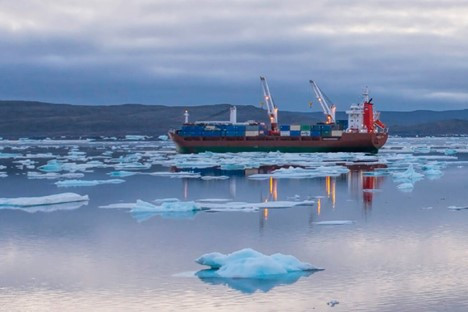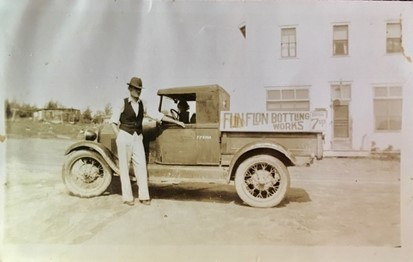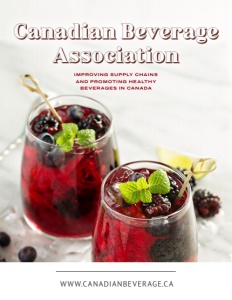Canadian Beverage Association
Improving Supply Chains and Promoting Healthy Beverages in Canada
Championing the efforts of its members, the Canadian Beverage Association addresses the challenges and impacts to the non-alcoholic beverage sector
Canada’s non-alcoholic beverage industry has been a vital part of the country’s economy, with the sector contributing $5 billion annually to the GDP and employing over 58,000 Canadians. The industry has proliferated from humble origins, with various players developing innovative beverages to cater to changing consumer preferences. This has added nearly $400 million to the country’s GDP and over 4,000 jobs nationwide.
With the global pandemic disrupting supply chains and forcing companies to re-evaluate their operations, the beverage industry has adapted to new challenges to meet consumer demand. Supply chains are the backbone of the beverage industry, ensuring that products reach consumers in the proper condition and at the right time. However, due to Canada’s vast size and remote regions, supply chains in the beverage industry have traditionally faced significant logistical challenges. Shipping to remote communities in the North, for instance, is expensive and complicated, leading to limited beverage options for residents.
 To address these challenges, the Canadian Beverage Association (CBA), the national trade association representing Canada’s non-alcoholic beverage industry, has been working to improve the beverage supply chain. One of the CBA’s initiatives that have significantly impacted the industry is the Balanced Calories Initiative (BCI). This initiative is a collaborative effort between the beverage industry and the government to reduce the number of calories Canadians consume from non-alcoholic beverages.
To address these challenges, the Canadian Beverage Association (CBA), the national trade association representing Canada’s non-alcoholic beverage industry, has been working to improve the beverage supply chain. One of the CBA’s initiatives that have significantly impacted the industry is the Balanced Calories Initiative (BCI). This initiative is a collaborative effort between the beverage industry and the government to reduce the number of calories Canadians consume from non-alcoholic beverages.
The BCI was launched in 2014 and set a target to reduce the number of calories consumed from beverages by 20% by 2025. On December 11, 2020, the Canadian Beverage Association was pleased to receive an update from the Conference Board of Canada (CBOC) about their Balance Calories Initiative (BCI). The beverage industry’s objective with BCI is to reduce the calories Canadians consume from beverages by 20% in the decade between 2014 and 2025. In this new report, Finding Balance, the CBOC has determined that the amount of beverage calories consumed by Canadians dropped by 16% between 2014 and 2019.
The Canadian beverage industry has a successful track record of leading voluntary initiatives. They include eliminating full-calorie soft drinks from schools and implementing front-of-pack calorie labelling, an initiative known as Clear on Calories. Through product and packaging innovations, the industry in Canada has already facilitated a 20% reduction per capita in beverage calories between 2004 and 2014. The Conference Board of Canada, an independent, evidence-based, action-oriented research organization with a non-partisan, balanced perspective, partnered with Canadian Beverage Association and its members to benchmark and verify the progress of this program. Their fourth report, Finding Balance, confirmed that the beverage industry is on track to meet its goal.
The success of the BCI is only possible if consumers can access products across the country. Transportation disruptions have been a significant challenge faced by the Canadian beverage industry, which has been investing in technology to improve logistics and distribution. CBA members have been working with transportation partners to optimize routes and reduce delivery times, ensuring timely and efficient delivery of products to retailers and consumers.
Arctic Beverages is one of the CBA’s members leading the way in providing healthier beverage options and improving the supply chain. Based in Flin Flon, Manitoba, with branches located throughout northern Canada, Arctic Beverages is a 100% Indigenous-owned and operated business serving remote communities in the North for over 85 years.

Shipping to remote communities in the North is a significant logistical challenge due to the region’s vast size and harsh weather conditions. However, Arctic Beverages has developed innovative ways to ensure residents in remote areas can access various beverage options. The company uses air, winter roads, rail and sea transport to get products to its remote retail customers, with planes flying out of major urban centres and semi-remote communities where the road ends. A barge service also travels along the western side of Hudson Bay and large ocean cargo ships out of Montreal into Nunavut during the summer months.
Arctic Beverages’ commitment to improving the supply chain in the North has not gone unnoticed. One of Arctic’s subsidiaries – Northland Beverages in Yukon – was awarded the 2020 PepsiCo Canada Bottler of the Year and was a Donald M. Kendall Award Finalist for its outstanding contributions to enhancing the beverage supply chain in northern Canada. Named for PepsiCo’s beloved former Chairman and CEO and dedicated to our independent bottling partners, no greater honour is bestowed within the Blue System. Being selected as a DMK BOY finalist distinguishes Arctic Beverages as the best of the best, driving the Pepsi Spirit with extraordinary zeal and expertise. By almost any measure – volume and share growth, per capita consumption, product quality, customer service and community involvement.
Arctic Beverages has also been successful in reducing caloric consumption in the North. According to the Northwest Territories Bureau of Statistics, the average daily caloric consumption from non-alcoholic beverages is 40% lower than the Canadian average. This reduction is due in many ways to Arctic Beverages’ promotion of healthier beverage options to its customers.
Arctic Beverages’ success in promoting healthier beverage options and improving the supply chain in remote communities is an excellent example of how businesses can positively impact their communities. The company’s commitment to providing residents in remote areas with healthy beverage options has reduced caloric consumption in the North and improved the overall health of residents.
As the beverage industry grows and evolves, businesses must address supply chain challenges and promote healthier beverage options. The Canadian Beverage Association’s Balanced Calories Initiative has significantly reduced caloric consumption from non-alcoholic beverages. Arctic Beverages, a CBA member, has been leading the way in improving the supply chain in remote communities and promoting healthy beverage options.
For beverage producers interested in joining the CBA and positively impacting their communities, now is the time to act. By working together, the industry can continue to innovate and find solutions to supply chain challenges while promoting healthier beverage options for Canadians. Joining the CBA is an opportunity to be part of a collaborative effort to impact the industry and society positively.
AT A GLANCE
Canadian Beverage Association
WHAT: the national trade association representing Canada’s non-alcoholic beverage industry
WHERE: Toronto, Ontario
WEBSITE: https://www.canadianbeverage.ca/


